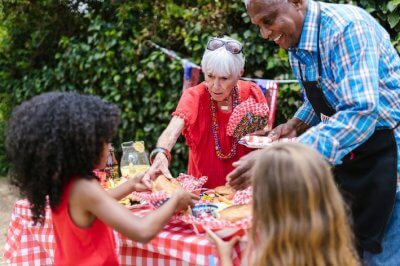Multigenerational Households – How to Navigate Living Together

photo by Rodnae Productions via Pexels
by Liz Szalai
Multigenerational households were once the common way of living, and still is in some parts of the world.
But in Western culture, with the need for independence promoted by society, the flexibility of work locations, and expat lifestyles? It all added to the rise of nuclear families instead.
But are things starting to change?
Are we moving back to multigenerational households?
One economic crisis after another, property price changes, rising tuition fees and student debt.… It’s been increasingly tough for young people to start their life in their own home. This has seen the rise of ‘boomerang kids‘, choosing to move back with their parents.
Then there are couples who earn less than childcare costs so choose to have family move in to help. Or families having their elderly parents move in as they are unable to afford the often extortionate costs of retirement homes. Or simply want to enjoy the last years of their parents lives.
A UK report shows that since 2009, the number of multigenerational households increased by 38%, particularly in London, the South East, and the North West.
The benefits of multigenerational living
Besides the economic, practical and cultural reasons of multigenerational living, let’s see how this arrangement benefits people who live in these settings.
Babies and Children

photo by: Rodnae Productions
From nursery rhymes to family recipes, children can learn many things from our older generations.
But research now shows the benefits are far more important than just traditions passed on. And can even compensate for a child being raised with only one parent.
A 2021 study published in the Journals of Gerontology shows that babies who grew up in a multigenerational household benefitted from improved thinking and reasoning skills. Even if that household consisted of a single parent plus grandparents. The study shares that:
“Relative to those from two-parent households, individuals who grew up in multigenerational households showed higher levels of cognitive functioning, including those living with a single parent and grandparents.”
Teenagers
“Ways of Being” is a model for social and emotional learning created by researchers Blyth, Olson, and Walker. The model was particularly created to help youth with the many challenges they face in a modern world. A world that sees them needing awareness, a sense of identity, and tools to navigate social situations.
The idea is that we have three main skill sets we develop when it comes to social/emotional skills. These are ways of feeling, ways of relating to others, and ways of doing. These skills are learned best together.
And as the researchers point out, family is the perfect place to learn these skills. Ideally, it “provides youth with opportunities to experience and practice across all three domains in a context that is most often experienced as safe, supportive, forgiving, and unconditionally loving”.
And intergenerational families provide greater opportunities for this learning. In a larger family, you can experience more celebrations, gatherings, and conversations. This means more modelled behaviour and more communication.
Younger adults

photo by Andrea Piacquadio
The Pew Research Centre released statistics in 2020 showing that over the ocean in America, the ‘Boomerangers’ trend is veering out of control. A startling 52% of young adults aged between 18 and 29 lives with their parents again.
Perhaps panicking parents need to console themselves with research that suggests it’s good for their grownup children’s health. A 2014 study coming out of Columbia University concluded that-
“Multigenerational living arrangements might improve financial resources, buffer stress, reduce loneliness, enhance intellectual sharing, and generate structural social capital, thereby elevating the level of one’s health.”
Older adults
Older adults could enjoy obvious benefits of multigenerational households, such as shared costs, care and companionship. But a very valuable factor for grandparents is to enjoy time with their grandchildren.
A study published in ‘The Gerontologist’ described that having an affectionate grandparent-grandchild relationship can reduce depressive symptoms in both groups.
And for younger children, a report by the Stanford Center showed that grandparents/older adults are very well suited to meet some of the young children’s needs. And the time spent with the young ones gives meaning and life purpose to elders.
Challenges of multigenerational households
Of course a complex family setting can present challenges as well.
According to a research conducted in the UK, problems appear when people feel like they have no privacy, personal space, or freedom.
Not being able to have friends around, or do what you would like to do, could make you feel restricted in your freedom or actions. A participant in the study shared, “If I have an argument with my husband, you feel restrained, you can’t have a proper row when your mother’s next door! It is a bit like always having a chaperone, which can be a bit inhibiting. Even when she’s not there, you’re kind of aware.”
In the end the research suggested that how content we feel in a multigenerational household depends on two factors. These are the involvement in the living arrangement ( if the people felt like they chose it, they felt more in harmony with their life) and privacy/ individual freedom.
How can we all live in peace?
So what can we do to live in peace in a multigenerational household?
1. Communication.
This is a crucial element of any community really, but could be tricky, especially if the family carries a certain communication pattern. If we can communicate our situation and problems freely, we will certainly eliminate possible stress factors. Mutual respect is a key, and to have empathy towards others.
2. Clear boundaries.
Two or more generations living together will have a different opinion on things. For example, grandparents will have an alternative opinion about raising their grandchildren than the parents, but they have to agree on a consistent approach.
3. The balance between companionship and privacy.
Having our own space and time is important. Even if it’s only a coffee enjoyed in silence in the morning, or some time for ourselves with our hobbies. The families where the members consider themselves happy with their multigenerational living situation described they feel togetherness and privacy in balance.
Living in a multigenerational household and finding it stressful? Need someone to talk to? We connect you with some of London’s best therapists. Not in London, or overseas? We also provide UK-wide registered therapists and online counsellors on our sister booking site.
Still have a question about this article and multigenerational households? Or want to share you own experience and tips? Comment below.
 Liz Szalai is a freelance writer and has a Master’s Degree in psychology.She worked with children and young people for more than 15 years, including teaching students with learning difficulties. Liz writes articles in various niches, has a holistic view of wellbeing, and a passion for destigmatising mental health. See more about her at @lizszalaiwriter.
Liz Szalai is a freelance writer and has a Master’s Degree in psychology.She worked with children and young people for more than 15 years, including teaching students with learning difficulties. Liz writes articles in various niches, has a holistic view of wellbeing, and a passion for destigmatising mental health. See more about her at @lizszalaiwriter.






